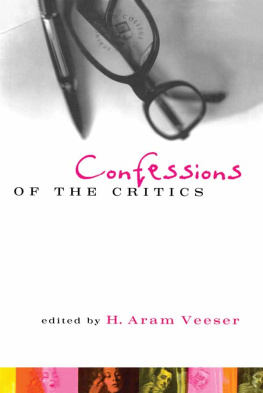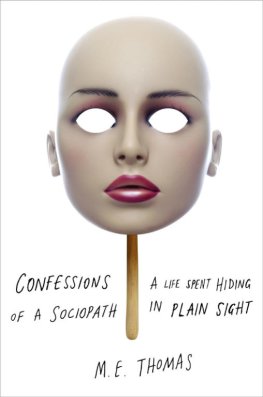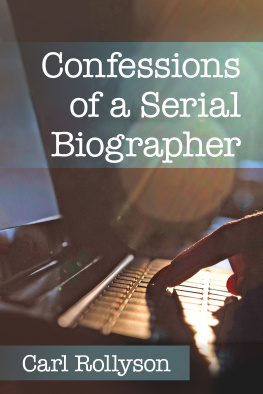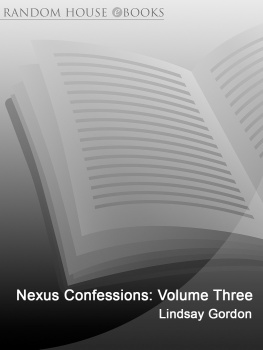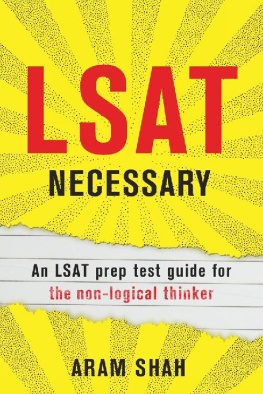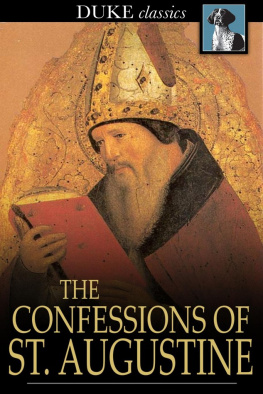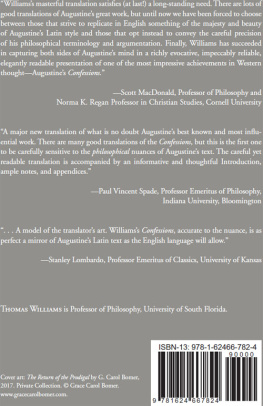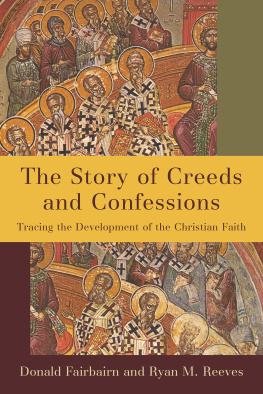H. Aram Veeser - Confessions of the Critics
Here you can read online H. Aram Veeser - Confessions of the Critics full text of the book (entire story) in english for free. Download pdf and epub, get meaning, cover and reviews about this ebook. year: 2014, publisher: Taylor and Francis, genre: Art. Description of the work, (preface) as well as reviews are available. Best literature library LitArk.com created for fans of good reading and offers a wide selection of genres:
Romance novel
Science fiction
Adventure
Detective
Science
History
Home and family
Prose
Art
Politics
Computer
Non-fiction
Religion
Business
Children
Humor
Choose a favorite category and find really read worthwhile books. Enjoy immersion in the world of imagination, feel the emotions of the characters or learn something new for yourself, make an fascinating discovery.
- Book:Confessions of the Critics
- Author:
- Publisher:Taylor and Francis
- Genre:
- Year:2014
- Rating:3 / 5
- Favourites:Add to favourites
- Your mark:
- 60
- 1
- 2
- 3
- 4
- 5
Confessions of the Critics: summary, description and annotation
We offer to read an annotation, description, summary or preface (depends on what the author of the book "Confessions of the Critics" wrote himself). If you haven't found the necessary information about the book — write in the comments, we will try to find it.
Confessions of the Critics — read online for free the complete book (whole text) full work
Below is the text of the book, divided by pages. System saving the place of the last page read, allows you to conveniently read the book "Confessions of the Critics" online for free, without having to search again every time where you left off. Put a bookmark, and you can go to the page where you finished reading at any time.
Font size:
Interval:
Bookmark:
EDITED BY
H. ARAM VEESER

First Published in 1996 by Routledge
605 Third Avenue, New York, NY 10017
Published in Great Britain by Routledge
2 Park Square, Milton Park, Abingdon, Oxon OX14 4RN
This edition published 2011 by Routledge
Routledge is an imprint of the Taylor & Francis Group, an informa business
Copyright 1996 by Taylor & Francis
All rights reserved. No part of this book may be reprinted or reproduced or utilized in any form or by any electronic, mechanical, or other means, now known or hereafter invented, including photocopying and recording or in any information storage or retrieval system, without permission in writing from the publishers.
Notice:
Product or corporate names may be trademarks or registered trademarks, and are used only for identification and explanation without intent to infringe.
The editors gratefully acknowledge the permission of the following publishers to reprint the following essays: Blackwell Publishers, for Auction Block Stories Masquerading as Objects by Marjorie Garber, from Critical Quarterly 34 (1992); Cambridge University Press, for Through the Academic Looking Glass by Vincent P. Pecora, from Radical History Review 60 (Fall 1995); University of Chicago Press for Speaking Personally by David Simpson, from The Academic Postmodern and the Rule of Literature, by David Simpson; Indiana University Press, for Pictures of a Displaced Girlhood by Marianne Hirsch, from Displacements: Cultural Identities in Question, edited by Angelica Bammer.
Library of Congress Cataloging-in-Publication Data
Confessions of the critics / edited by H. Aram Veeser
p. cm.
Includes bibliographical references
ISBN 0415-91410-8. ISBN 0415-91411-6 (pb)
1. Criticism. 2. Reader-response criticism. 3. Authors and
readers. 4. CriticsBiography. 5. Autobiography. I. Veeser,
H. Aram (Harold Aram)
PN98.R38C66 1996
801950904dc20
95-30071
CIP
ISBN: 978-0-415-91410-9 (hbk)
DOI: 10.4324/9781315870045
- H. Aram Veeser
- Diane P. Freedman
- Madelon Sprengnether
- Rachel M. Brownstein
- Candace Lang
- Charles Altieri
- Elizabeth Fox-Genovese
- Vincent P. Pecora
- David Simpson
- Gerald Graff
- Gillian Brown
- Marjorie Garber
- Marianne Hirsch
- Amitava Kumar
- Linda Orr
- Jeffrey Williams
- Timothy Andres Brennan
- Michael Brub
- Gayatri Chakravorty Spivak
- Stephen Greenblatt
- Bruce Robbins
- William L. Andrews
- Judith Lowder Newton
- Jane Tompkins
An MLA panel conceived this book's principal ideas and gave the volume its first resolute push into the world but for one reason and another the panelistsJane Gallop, Marianne Barnett, and Dominick LaCapraleft the project to fend for itself. Panelist Paul Bov took the anti-patrilineal logic to its limit by not even attending the session itself, though his ideas, like the other panelists', remain imprinted here. Fortunately, the intellectually wellheeled contributors who now comprise the table of contents stepped in and gave the volume great expectations.
I too had generous benefactors. The University of Utah Humanities Center, headed by Lowell Durham and Patricia Hanna, gave me a wonderful year away from home; Gallop's thrilling visit to the Great Salt Lake first inspired the project. The National Endowment for the Humanities donated my stay at the University of California at Berkeley, where James E.B. Breslin and David Farber, themselves transposed New Yorkers, helped stamp this volume as a Bay Area book. Most recently the Center for Literary and Cultural Studies took up the role of benevolent aunt-and-uncle; Herrick Wales and especially Barbara Akiba gave their ever-generous support, and Marjorie Garber created an incomparably rich and stimulating intellectual community where ideas could divest their old clothes and do a bit of serious cross-dressing. The book comes to term back home in Wichita, where Deans Phillip Thomas, Gerald Loper, and David Glenn-Lewin, English Department Chair Lawrence Davis, and Vice-Presidents James Rhatigan, Bobby Patton, and Peter Zoller have all given unstinting succor.
My own chosen ancestors remain Stanley Fish and Edward Said, who as uncles, not fathers, need not formally disown this book however much they dislike it. M y extra-Oedipal bonds extend to the widening gyre of deeply committed scholars who include Jane Marcus, Fred Pfeil, Don Hedrick, Paul Smith, Michael Sprinker, Catherine Gallagher, Dipesh Chakrabarty, and Barbara Harlow. Abdul JanMohammed offered some crucial insights into autobiographical criticism, as did Louis Menand. At Harvard's Du Bois Center, Sabine Sielke, Cornel West, Anthony Appiah, and Henry Louis Gates, Jr., gave my ear a colorful and cosmopolitan twist. Just down the road a piece, at the University of Kansas, Janet Sharistanian, G. Douglas Atkins, Cheryl Lester, Philip Barnard, and Iris Smith donated some vital conversation and occasions. My deepest debt is to Wichita State superstars Stephen D. Moore, Roger Berger, Albert Goldbarth, Deborah Gordon, Dennis Smithheisler, Rus Lopez, and Ken Pitetti. Stephen Magro, Eric Zinner, and Christine Cipriani presided at the birth of the book. William P. Germano was present at the conception and gave the book its name.
Sharon Kelley's brilliant library research got this volume off the ground. Secretary extraordinaire Janice Cryer lifted its chin and straightened its shoulders. Henry S. Kazan taught me all I needed to know about capital logic, and my brother Cyrus pressed forth the needed socialist corrective. To all these seen and invisible supporters: please accept my grateful hand and un abrazo fuerte.
The Case for Confessional Criticism
H. Aram Veeser
Students are always shocked when they come upon their teachers out of school: incredible! The teachers actually have a life apart from the classroom! Rachel Brownstein asks you to remember the delight and mischief and disbelief you first felt when your third-grade teacher turned up in a two-piece bathing suit at the beach. Why, that's Mrs. Fisherout from behind the desk, in a body! This two-sentence anecdote encapsulates that peculiarly Western duty to pass everything to do with the body through the endless mill of speech. You saw, and suddenly you are exclaiming, Why! Teachers today have not reversed the peristalsis and ceased to speak. They have come to appreciate the attention they suddenly command as soon as they slip into a body. That most austerely impersonal biographer, Arnold Rampersad, quipped during a recent talk at Columbia, When in doubt, wax autobiographical.
Until recently only the toughest critics dared to make the autobiographical move. Literary theory was against it. Conservative colleagues were against it. Personal critics themselves turned against it, chastising any critic bold and clever and successful enough to shock and thrill by interposing her own body.
Font size:
Interval:
Bookmark:
Similar books «Confessions of the Critics»
Look at similar books to Confessions of the Critics. We have selected literature similar in name and meaning in the hope of providing readers with more options to find new, interesting, not yet read works.
Discussion, reviews of the book Confessions of the Critics and just readers' own opinions. Leave your comments, write what you think about the work, its meaning or the main characters. Specify what exactly you liked and what you didn't like, and why you think so.

